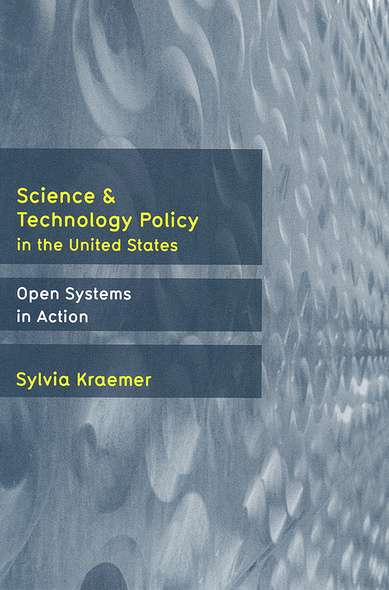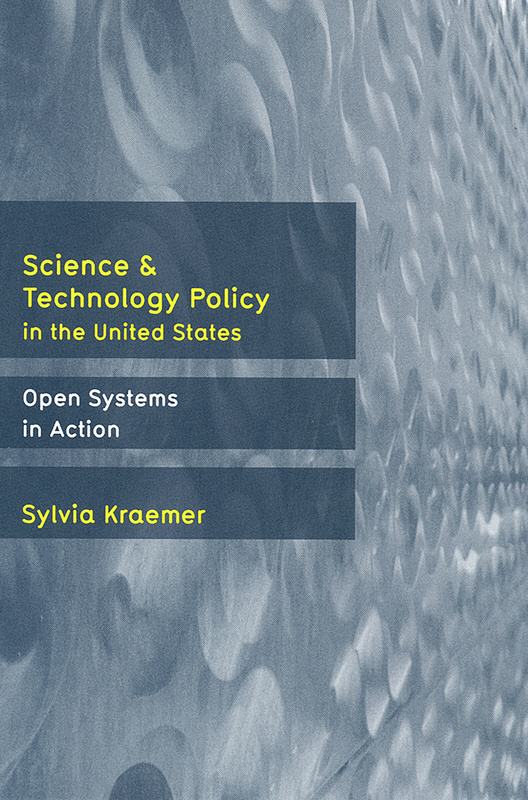Our shopping cart is currently down. To place an order, please contact our distributor, UTP Distribution, directly at utpbooks@utpress.utoronto.ca.
Science and Technology Policy in the United States
Open Systems in Action
During the latter half of the twentieth century, federal funding in the United States for scientific research and development increased dramatically. Yet despite the infusion of public funds into research centers, the relationship between public policy and research and development remains poorly understood.
How does the federal government attempt to harness scientific knowledge and resources for the nation's economic welfare and competitiveness in the global marketplace? Who makes decisions about controversial scientific experiments, such as genetic engineering and space exploration? Who is held accountable when things go wrong?
In this lucidly-written introduction to the topic, Sylvia Kraemer draws upon her extensive experience in government to develop a useful and powerful framework for thinking about the American approach to shaping and managing scientific innovation. Kraemer suggests that the history of science, technology, and politics is best understood as a negotiation of ongoing tensions between open and closed systems. Open systems depend on universal access to information that is complete, verifiable, and appropriately used. Closed systems, in contrast, are composed of unique and often proprietary features, which are designed to control usage.
From the Constitution's patent clause to current debates over intellectual property, stem cells, and internet regulation, Kraemer shows the promise-as well as the limits-of open systems in advancing scientific progress as well as the nation's economic vitality.
This is an outstanding piece of work by a leader in the field who brings intellectual depth and real-life experience inside federal agencies to her study of science and technology policy in the United States.
Kraemer's book ably sets policy and policymaking for science and technology in the United States where it belongs, in the larger context of the nation's political economy, and she convincingly contends that they best serve society when they operate in the light of democratic openness.
This is an original and important study that will have a significant impact on the way the scholarly community and the informed reading public view the reality of science and technology policy in this country.
Dr. Sylvia Kraemer superbly highlights historical events in the context of global science and technology competitiveness. Well written, the best history of the national policy evolution on the science and technology, this book is recommended for historians, policy makers and general readers alike.
Preface
Chapter 1.
A National and Open Commercial System.
Technological Innovation in "One Great American System"
Technology: A Critical Role in Economic Productivity
The Ideology of Science
Creating the National Science Foundation: A Closed System at Bay
A Partial Victory for The Bush Paradigm: The National Academy of Sciences
The Toolkit
Mission Agencies
Intra-mural Laboratories
Federally Funded Research and Development Centers
National Infrastructure and Regulatory Agencies
Targeted Programs.
Federal Procurement Policy
Priority and Profits: U.S. Patent Policy
The Broadened Scope of Patentability
Federally Funded Inventions
International Harmonization of Patent Laws
The Government Performance and Results Act (GPRA): Governing by Numbers
Scientific and Technical Data under the Freedom of Information Act
Reliable Information, Peer Review, and Federal Regulatory Policy
Federal Advisory Committees: An Alternate Route to Power
Cyberspace As An Open System
The First and Fourth Amendments in Cyberspace
Freedom of Speech
The Fourth Amendment.
Federal Regulation of Internet Highways
Monopoly Power in the Software Industry
Creatures of the Cold War: NASA and U.S. Space Policy
A Costly Aberration: Man on the Moon
Commercialization: Demobilization by Other Means
U.S. Space Policy in the Dawn of the 21st Century
Expert Authority
Feeding the Leviathan
Health Care Reform
The Promise and Perils of Biomedicine
A $100 Billion Pharmacopoeia and Too Little Flu Vaccine
Commercializing Biomedical Research: Open Systems in Conflict
Nature as an Open System and the Foundations of U.S. Energy Policy
Energy Supply and Demand: Policy and Paradoxes
Environmental Policy and the True Costs of Fossil Fuels
Index





